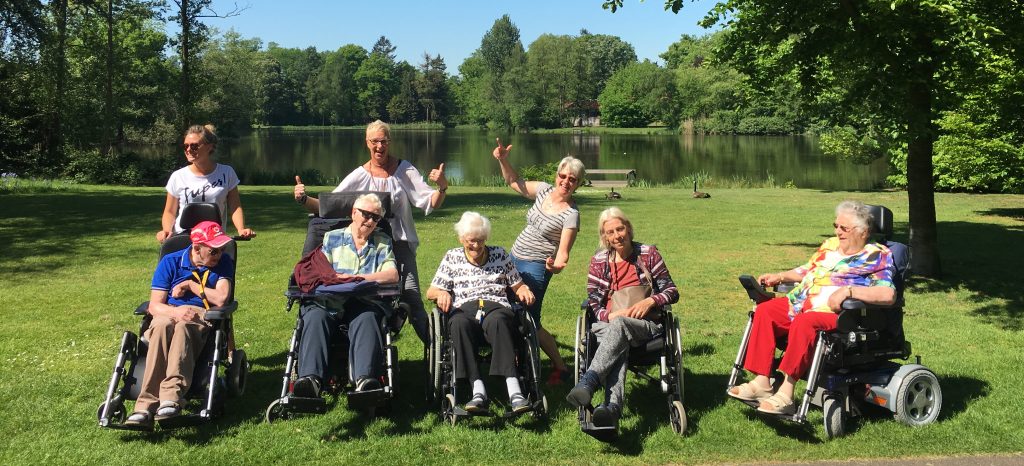
The Dutch care sector is currently shifting from a traditionally strong focus on health, protocols and standard practice to more emphasis on wellbeing, relationships and person-centred care. To provide guidance on how to provide and evaluate person-centred care by the use of narratives, Leyden Academy initiated the 2-year pilot project ‘Enjoying life’. Supported by the Ministry of Health, Welfare and Sport, the project aims to develop a narrative approach to both the delivery, as well as the evaluation of care.
Narrative approach
From April 2017 to March 2019, we piloted the approach in eleven nursing home organizations in the Netherlands. We used participatory action research to develop a training on narrative care delivery and evaluation, and to co-design the ‘Enjoying life plan’: a tool that helps staff to structurally pay attention to residents’ wishes and desires and to use narratives on personal experiences to evaluate quality of care. The narrative approach included the following four elements:
- Getting to know the resident’s identity
Traditional care plans focus primarily on residents’ physical care needs. To define these needs, we collect information on diseases and disabilities, often by using standardized questionnaires. To us, really getting to know the resident’s identity, including wishes and desires, is the starting point for person-centred care. What is important for this person? Which relationships does he or she cherish? In the project, we trained staff in using the Doodle Me Tool that invites open conversations about what matters most to residents, in the here and now. Before the training, most staff indicated that they already knew their residents quite well. However, after finishing the training, 87.0% of the respondents indicated that they got to know the residents better (58.7%) or much better (28.3%). - Using information on wishes and desires when providing care and support
Taking a residents’ wishes and desires into account, can contribute to positive and prevent negative care experiences. It can help to offer more personalized activities, facilitate important relationships, and allow space for fear, anger, or sadness. Last but not least, knowing wishes and desires and the corresponding personal relationship may help staff to be more sensitive and responsive to residents. During the training many creative, personalized Enjoying life plans were developed and we have seen countless beautiful examples, big and small, on how staff and significant others collaborated in initiating meaningful experiences. Staff indicated that they are actively working on creating opportunities for an enjoyable life during (62.2%) and after the project (76.6%). - Making dilemmas explicit
When providing care and support not only based on residents’ physical needs, but also on their wishes and desires, dilemmas are inevitable. In our approach a dilemma is defined as a difficult choice in which several options conflict with what is possible, allowed, expected, and/or what someone would like. For instance, choosing for freedom, may conflict with health or safety. In case of a dilemma it is important to look at the options from different perspectives. Staff encounter dilemmas every day, but they do not always make them explicit. Within the project, we taught staff to identify dilemmas, discuss the various options and perspectives and to make choices with regard to the ‘best option’. - Using narratives on personal experiences to evaluate quality of care
Finally, the registration of information on residents, as well as arrangements regarding their care and support is necessary for the evaluation of quality of care. In traditional care (plans), quality of care is assessed mainly from a normative perspective, based on numbers and figures with one reference point for everyone. In our narrative approach, the evaluation of quality of care should be based on the personal experiences of staff, residents and their significant others. Registering experiences in a care plan can guide staff in the everyday delivery of care and help them (as well as organizations in general) to keep learning and improving. Furthermore, it can be used in the justification of quality of ‘narrative care’ to external parties. During the training, we learned that sharing personal experiences motivates staff to create more (positive) experiences and to communicate these with residents’ significant others.

Enjoying life
These four elements also helped to shape the Enjoying life plan. This plan was developed collaboratively with staff members while they applied the plan in their everyday practice. Staff indicated that the Enjoying life plan is simple to use, meets their objectives in work and helps them to focus on what matters most to their residents and to make choices that enhance their wellbeing. In addition, they indicated that the narrative approach contributes to their own happiness at work. For most of them, providing personal care based on wishes and desires was one of the main reasons to start working in care in the first place.
Conclusion
The 2-year Enjoying life pilot-project was concluded in April 2019. It was very well received by the residents and their significant others, as well as directors and managers of the organizations. As a consequence, we believe that the introduction of this scalable narrative approach in nursing home care is a successful first step in really putting wellbeing first, and fundamentally changing the way we observe and evaluate quality of nursing home care. Our ambition is that all nursing homes in the Netherlands will work with a Enjoying life plan (or a similar equivalent), containing relevant normative and narrative information.
Follow-up projects
To this end, we have started several follow-up projects. We are developing training materials and videos to help organizations make the transition. We are also upscaling the initiative to two complete locations of two care organisations to explore how the Enjoying life plan can be best implemented in the current systems and ways of working, and what issues or challenges may be encountered. Besides the Ministry of Health, other parties that supervise the quality of long-term care in the Netherlands are closely involved in this follow-up project, such as the Health Inspectorate, the National Health Care Institute, the Dutch Healthcare Authority, and two leading health insurers. The involvement of all these parties is crucial to make the transition succeed. We all share the same objective: to make a positive change for the older people entrusted to our care and make sure their last phase of life is as enjoyable as possible.
In September 2019, the project was featured in the British journal Nursing and Residential Care.
For more information, please contact Josanne Huijg.